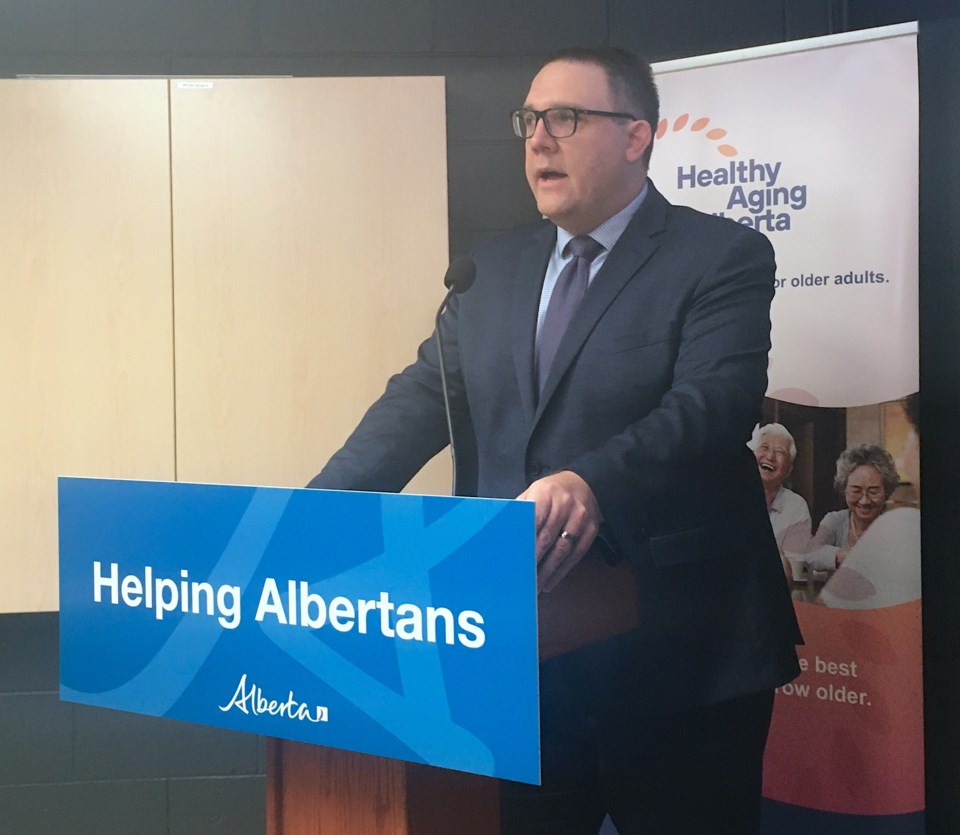SUNDRE – It could be upwards of two years before the provincial government's bureaucratic reshuffling that breaks Alberta Health Services down into four new administrative branches yields any kind of actual relief for staffing shortages on the frontlines.
“Some of those changes are going to be fleshed out as we work with frontline services over the coming months,” said Jason Nixon, minister of Seniors, Community and Social Services.
“This is going to be a two-year process, but at the end of this, I believe that we are going to have better front-line services, more regional control and input, and it’s going to be better for Albertans long-term.”
In response to then being asked if that meant more bureaucracy is not necessarily always automatically a bad thing, he replied, “To be clear, that is not what I said. While there are new organizations coming in, they’re replacing existing organizations that were within the system.”
Nixon, who is also the Rimbey-Rocky Mountain House-Sundre riding’s MLA, was at the Greenwood Neighbourhood Place Society’s boardroom last week for a provincial government announcement about new grant funding for non-profit groups that provide transportation services.
During a media question period following the announcement, Nixon was asked by the Albertan about the impending change that will break up AHS into four new organizations and more specifically, how all of these new layers of bureaucracy and what amounts to a major reshuffling of middle-management positions will alleviate short staffing pressures.
Answering evasively, the MLA began his response by reiterating a previous talking point assuring that “there will be no changes to the front-line services for any Albertan and how they access the health-care system.”
He added health care will continue to be publicly funded and free for Albertans to access.
“I want to be clear on that,” he said. “If there’s an emergency today, you go to the emergency room.”
However, there have been some emergency rooms throughout the province that have intermittently experienced and reported temporary closures when faced with a shortage of available staff. Click here for updates on closures and service disruptions.
Nixon went on to say facilities and services from continuing care to addictions recovery programs will continue to be available.
“So day-to-day, for Albertans, not much changes,” he said.
Finally getting around to addressing the original question about how new layers of bureaucracy will facilitate bringing in more doctors and nurses, the minister said, “there are new organizations coming in, but they’re replacing existing organizations that are already within the apparatus of Alberta Health Services.
“The reality is, the large organization known as Alberta Health Services has not been serving our communities adequately. We have people waiting unprecedented amount of times for surgeries, we have shortages of services inside rural communities like ours, and the time has come for something to be done different,” he said.
“There is going to be changes within middle management and other structures of that organization, to be able to make sure that we get it efficient and focused on keeping care of Albertans,” he said, re-iterating that no front-line positions will be lost throughout that process.
“In fact, we will be doing everything we can to get more resources to the frontlines.”
Meanwhile, the official Opposition sees the move as an attempt to concentrate power in the premier’s office that will only result in creating additional chaos throughout the health-care system amid an already challenging time, while doing nothing in the short-term to immediately take measures to resolve the issue of staffing shortages.
“Danielle Smith and the UCP want to bring our public health care from an arm's length into their own back pockets,” said Anahi Johnson, an Edmonton-area registered nurse, who earlier this month joined an NDP press conference in Edmonton.
“This will not serve Albertans. It will create layers of bureaucracy. Funnel public funds away from patient care, create greater systemic inequity, and put our entire public health at risk,” said Johnson, who added frontline health-care workers should have been consulted prior to making such sweeping changes to the system if the provincial government truly cares about their feedback.
Raj Uppal, a health-care aide who also attended the NDP conference, said a “reorganization of the higher powers” will pave the way for public dollars to end up “lost to the powers that be instead of (invested) on the floor.”
However, the NDP agrees AHS needs to be revamped, but rather from the ground up.
“We believe health care does need reform, through investment in the frontlines and a massive recruitment and retention campaign,” said David Shepherd, Alberta NDP health critic for rural and primary care, expressing concerns about the potential risks identified in the government’s own plan.
“What Danielle Smith described will make health care slower and harder to find and more fragmented. It means inferior health care for Albertans and that’s unacceptable,” he said.
Dr. Paul Parks, Alberta Medical Association president, was more congenial in his Nov. 8 statement responding to the provincial government’s plan.
Acknowledging longstanding “concerns about the effectiveness and quality of health care delivery,” Parks added the association has heard from members “who have told us that they want government to address sub-optimal health care outcomes. We also know that many members support more authentic local decision-making in the health care system.”
With that being said, the physician stressed the importance of meaningful engagement with doctors to avoid adverse impacts on patient care as the government moves forward on restructuring the system.
“Our health-care system is already in a fragile state,” he said.
“The consistent message I have been hearing from physicians across Alberta is that any changes made in our system must involve input from experts on the frontlines – the physicians and allied health care workers who are dedicated to patient care. While it is reassuring to see that the government is committed to consultation, we will be working diligently to make sure they get and heed our input.”



